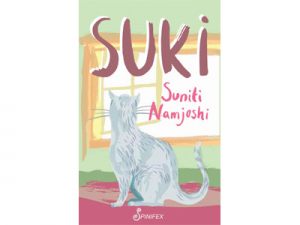lip lit: suki
Suki, at first glance, seems to be about very little. The new novel from fabulist Suniti Namjoshi has a minuscule cast of characters: for most of the tale there’s just a narrator—the unnamed, author-analogue ‘S’—and a subject—S’s cat and the titular Suki. S is a writer of fables and poetry who spends her days scribbling away in her office, puttering around the garden, and debating the meaning of life with her cat. Suki describes a perfectly ordinary owner-cat relationship: Suki hates going to the vet, Suki likes going into the garden, Suki doesn’t like dogs, Suki doesn’t like other cats, and so on. Suki doesn’t really like people other than S, whom she affectionately tolerates; by contrast, S is extraordinarily attached to Suki, an attachment that she struggles to understand through discourse with Suki. The plot is slowly unveiled in a very dialogue-heavy fashion; S talks to Suki, asks her questions, and tells the reader stories about the questions she puts to Suki and Suki’s thought-provoking answers.
The writing is quirky and lovable (as is Suki herself) but it is clear after the first few chapters repeat their question-and-answer pattern that the reader is not in for a plot-driven experience. If you’re not reading for plot, what are you reading for? Namjoshi takes the strange, prattling conversation we cat-owners always have with our reticent pets and turns it in to a literary device for asking big philosophical questions: why are we here? Do animals feel pain? What does dying feel like? What happens when we die? The conversational structure of the novel prevents S’s thoughts from becoming rambling, or slipping into an incomprehensible stream-of-consciousness. There is a logic, a rhythm to S’s questions, because they all centre around her relationship with Suki, ideas of love and life, how we deal with our grief, and the impact of death upon the still-living.
It was clear I was beginning to bore her so I brought my question out all at once. “Suki,” I demanded, “are you a moral animal?”
“Do you mean human morality?” she murmured. She looked as though she was nearly asleep by now.
“What other kind is there?”
“I don’t know,” Suki answered sleepily. “But from what I understand of what you understand of human morality, no, I am not a moral animal.”
“But don’t you care about being a moral animal?” I yelped at her. I was genuinely shocked.
This time Suki didn’t answer. She was genuinely fast asleep.
The first half of the novel attempts a half-hearted realism: sure, Suki “answers” her owner’s enquiries, but the reader feels safe in assuming that S is simply projecting her own thoughts onto an animal avatar. The second half of the novel abandons the real world altogether and twists the narrative into something more like the fables that the author/narrator writes; suddenly, the novel is taking place entirely inside S’s mind. The characters are all facets of S’s personality, the distilled essence of her greed, her insecurity, her love, and along with S and Suki the reader contemplates Buddhist teachings regarding detachment and enlightenment. It sounds heady, and although you might expect someone to take on such a significant subject in a dramatic way, Namjoshi’s approach is a quiet and subtle one that is ultimately more influential than a brasher take might have been.
“No, no,” Suki says kindly. “Sometimes what you say is quite interesting. And besides, there’s always a reality check. I stop you, you know, when you go too far.”
“But Suki,” I blurt out, “you’re only a memory.”
Astonishingly, she isn’t offended. “It all helps,” she says peaceably.
Like all writers, Namjoshi has a magpie-like tendency to borrow from her own life, though it seems inaccurate to classify a work of such imaginative and philosophical scope as pure memoir. Suki is more love letter, more fable, more neatly arranged than real life could ever hope to be. It is a chameleon-like novel, one whose meaning shifts between the first and second reading; a novel that I expect to have a completely different effect upon me when I return to it in ten years time, or even two. Like all great literature, Suki is less about a series of significant events, and more about the significance of seemingly insignificant moments; the unexpected but nonetheless delightful impact of the simplest, most uncomplicated relationships; and the ability of something as mundane as a connection with a beloved pet to transform ordinary existence into something magical.


